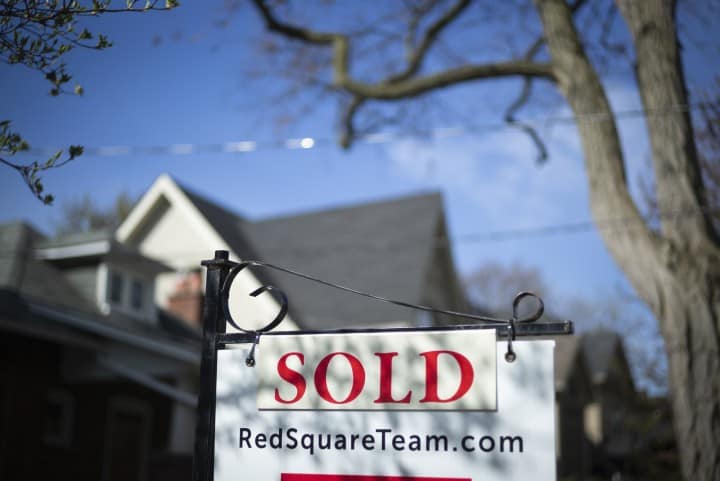Detached house prices up 15 per cent since last year in Brampton
Published September 7, 2020 at 6:55 pm

When the COVID-19 pandemic and associated lockdown hit Ontario, some suggested the GTA’s white-hot housing market was going to take a hit.
When the COVID-19 pandemic and associated lockdown hit Ontario, some suggested the GTA’s white-hot housing market was going to take a hit.
Six months into the crisis, house prices in Brampton and surrounding cities are up year-over-year, with the low-rise market experiencing significant price growth as residents flee from condos in search of larger yards and a little additional space.
The Toronto Regional Real Estate Board (TRREB) reported 10,775 home sales through its MLS system for August, up more than 40 per cent from 7,682 in the same month a year ago. Sales of detached homes rose 50.6 per cent and semi-detached houses climbed 66.8 per cent, while condo sales growth was slower, at 10.9 per cent.
The average price of a home sold in the region was $951,404, up more than 20 per cent from $792,134 a year ago.
“Between March and June … sellers took their homes off the market. A lot of people were afraid to have strangers walking through their homes,” says Michael Grant, a sales representative at Royal LePage Infinity.
“Around mid-July … all of a sudden it seemed that everyone had the same feeling: ‘Let’s jump into the market’.”
In spite of the record-setting sales in July and August, TRREB said year-to-date sales have not caught up to where they were this time last year, given how significant the drop in sales was during the spring. Only sales of detached homes have surpassed 2019 levels so far this year.
“Inside the city people are selling single-family homes, the low-rise models, the detached, the semi-detached, and they are moving out of the city,” says Charlene Williams, real estate broker at Real Estate Homeward Brokerage.
Zoocasa, a real estate website and brokerage, says that home sales were up 35 per cent year-over-year in the Region of Peel, with 2,301 homes sold in Mississauga, Brampton and Caledon.

Sadly for prospective buyers looking for a break, the average sold property price hit $897,391–a 20 per cent increase compared to last August. Since February, the last full month before COVID-19 emergency measures were implemented, the average home price rose 4 per cent.
Zoocasa says that overall, Peel Region remained a sellers’ market this August.
As for Brampton in particular, Zoocasa says 1,195 homes were sold in August, resulting in a 45 per cent annual increase.
“A monthly transaction level of around 1,200 has not been seen since May and June 2016 when home sales reached 1,253 and 1,230, respectively,” Zoocasa says, adding that the average home price also saw a notable increase, hitting $853,445–a 16 per cent jump from last year or an increase of about $119,083.
By property type, detached houses and semi-detached houses experienced an annual sales growth of 49 per cent and 56 per cent respectively, while the change in condo apartment sales was flat.
According to Zoocasa, the growth in average sold prices for these property types trended in the same range year-over-year, with the detached house price increasing 15 per cent (to $989,039), the semi-detached house price rising 14 per cent (to $768,775) and the condo apartment price growing by 13 per cent (to $464,741).
The average prices for both detached and semi-detached houses in August reached monthly highs in the Brampton market.
TRREB says the trend is apparent across the GTA, as condos are increasingly hitting the market as people move toward low-rise communities, “with growth in condominium apartment listings well-outstripping condo sales growth,” according to Jason Mercer, TRREB’s chief market analyst.
Board president Lisa Patel attributed part of the market’s overall sales growth in August to “improving economic conditions and “very low borrowing costs,” as mortgage rates remained low. Statistics Canada previously reported that almost 2.2 million Canadians were unemployed in July, nearly twice as many as in February, but unemployment levels were down from record highs.
“It’s mostly investors that are putting the condos on the market because they are not able to get renters. Tenants aren’t able to pay the rent … they are the ones that have lost their jobs,” says Williams.
Going into fall, market watchers are eyeing how mortgage deferral rates and the end of other government income supports will impact the real estate market, according to a separate report on interest rates released by Finder.com on Thursday.
Sri Thanabalasingam, senior economist at TD Bank, said a Finder.com’s report said that “a partial labour market recovery and ending mortgage deferrals could increase housing supply later this year, potentially putting downward pressure on prices.”
“People want to see what’s going to happen if the deferrals will have an impact on housing prices,” says Grant. “They are interested in holding off but they want that pre-approval, they want to lock-in that (mortgage) rate … They are able to afford more home with lower interest rates.”
Not everyone has a glum outlook: A survey of Remax brokers suggests that the average residential sale price in Canada could increase by 4.6 per cent through the rest of 2020, owing to Canadians looking to flee urban centres in search of more space.
“Predominantly in government, banking, insurance … the clients I’ve worked with just continued to work during the pandemic. There wasn’t any downtime or layoffs, they have just shifted to working from home,” says Grant.
“It’s kind of the haves versus the have-nots. There is not much middle ground in Toronto.”
With files from Anita Balakrishnan, The Canadian Press
INsauga's Editorial Standards and Policies








